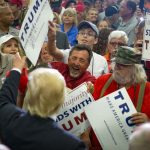 Political polarization has been a hot topic around the world in recent years, with political commentators concerned that it’s reducing the effectiveness of democratic systems, and democratic governments. Indeed, a recent study from the University of Cambridge pinned the blame on squabbling and partisan governments for plummeting confidence in democracies around the world.
Political polarization has been a hot topic around the world in recent years, with political commentators concerned that it’s reducing the effectiveness of democratic systems, and democratic governments. Indeed, a recent study from the University of Cambridge pinned the blame on squabbling and partisan governments for plummeting confidence in democracies around the world.
Recent research from McGill University offers a glimmer of hope, however, and argues that polarization is something that can be reversed. The researchers worked with a few hundred volunteers in the lead up to the 2016 US presidential election. Each participant was asked to compare Trump and Clinton on a range of leadership characteristics, such as vision and courage.
Via a slight of hand, the researchers then manipulated the results so that most of the answers appeared to be moderate and around the midpoint between the two candidates. These were then presented to the volunteers as their own answers.
Taking a moderate stance
Amazingly, some 94% of respondents accepted these newly moderate stances as their own, and even began to justify the views. The researchers recall how one previously fervent Trump supporter reported feeling that they had always felt they were somewhere in the middle, and that being open-minded was important. This was despite just moments earlier expressing highly polarized views.
The study was replicated via an online survey with around 500 participants, and once again, most of the volunteers were susceptible to manipulation by the researchers into thinking their views are more moderate than they are. Equally, as before, they then began trying to justify their supposedly moderate views.
“Political surveys try to capture the attitudes of the public, but our study demonstrates that these can be heavily manipulated,” the researchers say. “By making people believe that they wrote down different responses moments earlier, we were able to make them endorse and express less polarized political views. These results offer hope in a divided political climate: even polarized people can become — at least momentarily — open to opposing views.”